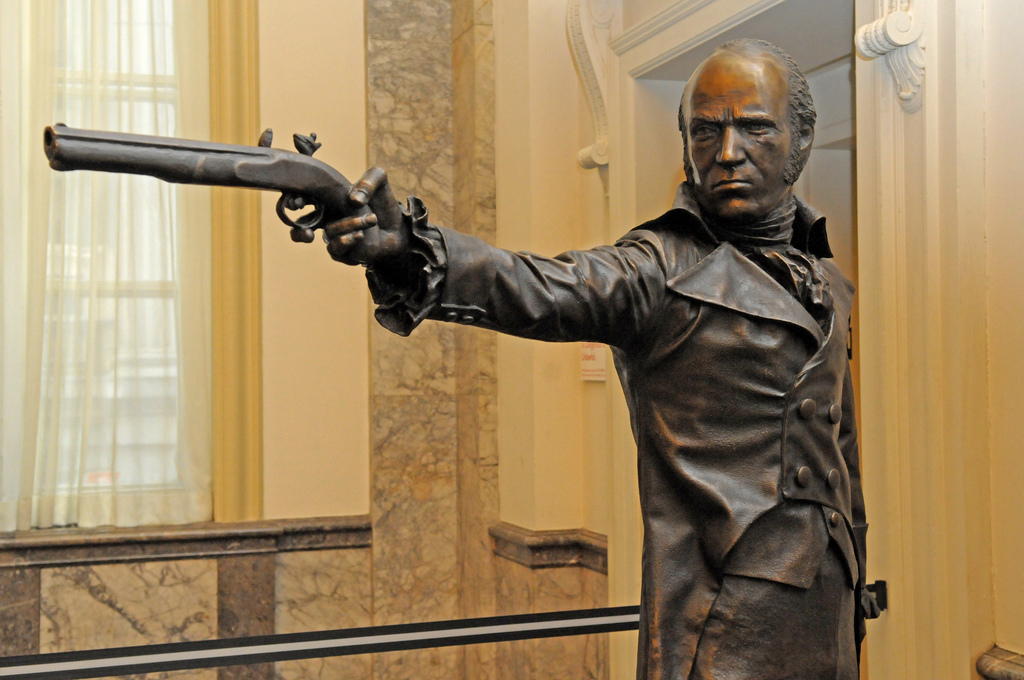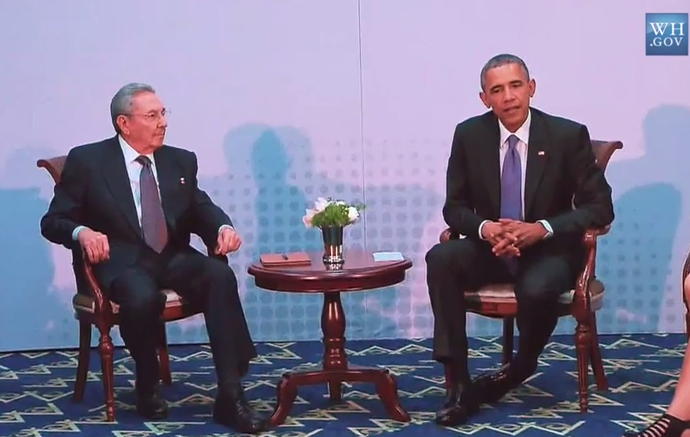Essential Revolution: The Return of the Republicans
For two years, Democrats held the House, Senate, and White House. All they did with it was raise health care prices, destroy a competitive insurance market, and send billions to crony projects via “stimulus” bills.
It’s easy to forget, though, that Republicans held the House, Senate, and White House for a few years as well. They worked, among other things, to shore up social security and stave off a housing collapse. “Worked” is somewhat of an overstatement, however: at the first signs of opposition from Democrats, they bolted.
This time needs to be different.
Over the last several years, of course, Republicans have been in the minority, first in each of the House, Senate, and White House, and then by way of holding the House against the Senate and White House. The House blamed the lack of passing bills, justifiably, on Harry Reid, who blocked almost everything the House produced.
But now that Republicans hold the Senate, they can’t blame Harry Reid for not sending legislation to the White House. They need to re-pass important legislation and get it to the President’s desk. They need to pass two kinds of legislation: legislation that President Obama claims to support and legislation that outlines the Republican vision of the future.
For example, the President has claimed to want people to be able to keep their health insurance, and has issued an executive order stating this. However, his order excludes any insurance policies issued over the last four years. The House and Senate should pass a simple, one-page bill that codifies the President’s executive order on this, but also includes more recent policies.
Then, they should pass a one-page bill that opens these policies to anyone previously covered by the policy under someone else’s name, such as children coming of age.
Republicans will undoubtedly pass tax reform as well. Here, as well, they need to keep things simple. It is sickening how the media lies about conservative proposals; even during this election the media claimed that a Republican candidate wanted to “slash” spending on a project when the Republican didn’t want to increase spending by as much as their opponent. An increase in spending is not slashing spending, no matter how much more the other side wants to increase spending. The same is true for tax reform. If Republicans were to pass something like Ryan’s tax reform that cuts the rate at which the rich pay taxes while also removing all of the loopholes the rich currently use to not pay taxes at all, the media will still claim that Republicans are “cutting taxes for the rich” even though the rich will pay more in taxes.
There’s no way around the fact that the media will lie, but keeping bills simple and keeping titles descriptive can make their lies more obvious. Republicans should pass one-page or even one-paragraph bills that say what they mean, not omnibus bills that the press can see what they want in—because what they want is to make Republicans look bad.
Simplicity is the best transparency.
In response to Republican principles: When John Deere starts losing the tractor business, they don’t say “let’s make ice cream”. They make better tractors.
- December 23, 2015: The Sunset of the Vice President
-

Aaron Burr, the last Vice President elected before the tenth amendment.
Ever since the Vice President changed from being the President’s most popular opponent to the President’s partner—with the passing of the twelfth amendment in 1804—the Vice President’s job has faded.
It occurred to me that, rather than having all laws automatically sunset after a period of time, they could become eligible for removal after that period of time, but that an elected official would be responsible for going through the laws and choosing which haven’t done what they set out to do. It should be an official whose popularity then hinges on what they repeal, rather than what they enact.
The Vice President might make a good choice for that position, as the Vice President doesn’t actually have much in the way of official responsibilities. Ties in the Senate are pretty rare and while the Vice President can preside over the Senate, there’s not actually a lot of responsibility there. The Vice President’s arguably most critical duty, the 25th amendment power to get the cabinet together and declare the President “unable to discharge the powers and duties of his office” is one that so far has never been invoked.
A Law1 becomes eligible for repeal by the Vice President seven years after it becomes a Law or after two thirds of the State Legislatures petition the Vice President for repeal of the Law. The Vice President must report these Laws to Congress and the States. Congress may, within sixty days, block repeal with a two-thirds vote in each House. Alternatively, two-thirds of State Legislatures can vote to block repeal within 120 days. If repeal is not blocked by Congress or by the several States, the Law is repealed 120 days after the Vice President reports its repeal.
This provision does not apply to Laws whose sole purpose is the repeal another Law.
Congress would of course be free to re-pass the law, but this would open the law up for debate again, and there would be a better chance of learning from the failure of the first go-round. It is a lot easier to acknowledge the need for change once the original is gone.
There aren’t a lot of provisions in United States law for reducing the scope of the federal government. We need a few. And this would give the Vice President an answer to the perennial question, “what did you accomplish while you were veep?”
It would also make Vice Presidential debates a whole lot more interesting.
- August 12, 2015: A tested alternative for Iranian nuclear negotiations
-

“On March 21, 2015, Iran’s supreme leader Ali Khamenei backed and shouted the phrase ‘Death to America’ while addressing a public gathering in Iran.” (seysd shahaboddin vajedi, CC BY-SA 4.0)
President Obama claims that his administration’s nuclear deal is the only alternative to war. This is a pretty standard debating tactic of the President’s: its his way or some broken-down highway filled with spike-covered reavers, and there’s nothing in between.
In this case, though, the alternatives are probably not that obvious inside the beltway, because they require thinking long-term and thinking about freedom. The obvious non-politico-friendly alternative is to simply wait until a better deal can be negotiated. We are giving Iran a lot in exchange for this deal. If we aren’t getting much of anything in return—if, in fact, Iran is allowed to get as close to nuclear weapons as it wishes without actually touching them, and is allowed to lie about touching them—then why give up that leverage? It may well be useful later.
But there is a third way, besides war and waiting, that has worked in the past. And that is to tie closer relations and/or lessened sanctions to their creating a more open society.
If we require that Iran free their political prisoners, this will make Iran a safer place for the greater voices it has. If we require that Iran stop cracking down on dissidents—cracking down in the old-school way of killing and maiming them—then Iran will in fact be a safer place for the people willing to speak out.
If we require that Iran allow anyone to leave Iran who wants to, Iran’s stranglehold on its dissidents is nearly completely removed.
If we do those simple things—if we believe in the power of freedom to transform—we may well end up with a repeat of the reasonably bloodless revolution that threw down the Soviet Union, as Iran responds to the now visible voices against its tyranny. But even if we aren’t, Iran will be a better place, with more voices, some of whom will end up in government and be more open to negotiating real nuclear reforms. Without Senator Jackson and President Reagan, Gorbachev would not have been Gorbachev.
- August 5, 2015: We are not free unless we fight for the freedom of others
-

I am coming to the belief that the old cliché that no one is free unless everyone is free has a very special, and true, meaning for the United States.
There is an old theory in psychology that I’m aware of mainly because it was my faculty advisor’s at Cornell. It is that for many of the ways we see ourselves, we observe ourselves from the outside, and make conclusions about ourselves as if we were an outside observer. If we see ourselves doing kind things, then we see ourselves as kind. If we do free work in favor of some political cause, we will assume that we must support that political cause.
Now, he wasn’t saying that we act randomly and decide what we are based on our random acts; many things we do because we are the kind of person who does them. But many things we don’t. We go along with friends or family or coworkers on things that don’t matter to us, but, his theory goes, when we go along we start to believe that’s who we are.
If we never really thought about a vacuum cleaner, and the vacuum cleaner salesman convinces us to let him into our home, perhaps we really were interested in a vacuum cleaner. Maybe we do need a new one.
That is, we are what we do, rather than we do what we are. I think something similar works on the national level, that we see ourselves, as a nation, based on what we do as a nation. This would mean that linking, Sharansky-style, freedom under tyrants to any deals we make with those tyrants, makes us freer too because we see ourselves as a free country, in opposition to the tyranny elsewhere.
If we link beneficial deals with the USSR to their freeing and not harassing dissidents, then we will value more closely our freedoms at home. And if we position ourselves to pragmatically ignore the tyranny in Iran or Cuba in favor of short-term gain, well, we will be more pragmatic at home as well, and our freedom here will suffer.
We are not free unless we understand the power of freedom to transform.
- July 29, 2015: Cuban Cigar Aficionado
-

President Obama meets with Cuban dictator Raúl Castro.
Coinciding with me finishing Natan Sharansky’s The Case for Democracy, in their May/June issue Cigar Aficionado welcomed normalizing relations with Cuba, and the opportunities for more fine cigars from Cuban tobacco fields. And in their July/August issue, they printed some letters from people who disagreed and would prefer that normalizing relations also require the Castro regime give something in return other than fine cigars.
Dear Marvin,
You are on the wrong side of the life and liberty with your April Cuba policy editorial. When negotiating you always get something back. The Obama policy is simply to give to a brutal dictatorship and get nothing for the oppressed Cuban people.
As a Cuban who lived through Fidel’s revolution I witnessed the confiscation of all the fruits of hard work of generations of industrious Cubans. The fact is that the Cuban people have no freedom of speech, no freedom of assembly and no free press. While the elite of the communist party live a good life and have full access to food, entertainment, good housing, clothing, the best beaches, etc., those outside the party have to work as directed and have to settle for whatever is rationed to them. At the same time the Cuban lives in fear of being turned in to Castro’s regime by the numerous party spies spread through all the neighborhoods.
Obama wants to open the flood of money into Cuba, without constraints, but that money will only go to the elite of the communist party and will not benefit the people. Any freedom-loving president would demand, at a minimum, freedom of press and right of free speech in return.
…
Alberto G. Solana
Editor’s Response: We agree that the people of Cuba do not have access to the freedom so many others enjoy, including those of us who live in the United States. However, we believe that ending the embargo is one way to create needed change. The policies of the past 50 years have not worked. It is time to try something different.
- May 12, 2015: Government oxymoron: anti-corruption laws
-

There’s a lot to be said for chiseling laws in stone by hand rather than typing them at high speed on a word processor.
In the latest Weekly Standard, Jay Cost asks, So, what about money in politics?, taking Republicans to task for twiddling their thumbs while Democrats rant about Citizens United. He concludes that while the Democrats have enacted self-serving reforms that ban things they don’t use and exempt the corruption they rely on, conservatives shouldn’t just make fun of their hypocrisy nor rail against their counter-productive, corruption-causing laws. To win the minds of the public, conservatives “must promote ideas to constrain influence-peddling in politics, and then pressure the ever recalcitrant GOP to enact those reforms into law.”
Now, on the one hand, he’s right. When one person is doing something that makes matters worse, and another person is arguing against doing something because it is just making matters worse, there is a strong tendency in the modern world to side with the person who is at least acting.
But from the standpoint of actually reducing corruption rather than increasing it, he’s wrong—as described in an earlier article in the same issue, where Stephen Moore argues for simplifying the tax code because layer upon layer of laws “mostly benefit the wealthy and politically well-connected.”
The only people who benefit from a complicated, barnacle-encrusted 70,000-page tax code are tax attorneys, accountants, lobbyists, IRS agents, and politicians who use the tax code as a way to buy and sell favors. The belly of the beast of corruption in American politics is the IRS tax code. — Stephen Moore (Remember the Flat Tax?)
We’ve long passed the point where adding laws can have a beneficial effect; the problem is that our laws are so complex that only the wealthy and well-connected can understand them, and because of this they get to manipulate them. Get rid of the complexity and “D.C. becomes the Sahara Desert.”
This is hardly news. The philosopher Lao Zi described the process millennia ago when he wrote that:
- April 19, 2015: Comparing our Iran negotiations to our Soviet negotiations
-

Iranian protestor, June 17, 2009: “They killed my brother, because he asked ‘where’s my vote?’”
Someone a lot smarter than me is noticing that we do not see ourselves as a beacon of freedom, as we did when we opposed the Soviet Union. Natan Sharansky asks, When did America forget that it’s America? He is basically pointing out the same thing I did: that we are not defining civilization as better than barbarism.
As a former Soviet dissident, I cannot help but compare this approach to that of the United States during its decades-long negotiations with the Soviet Union, which at the time was a global superpower and a existential threat to the free world. The differences are striking and revealing.
…
Imagine what would have happened if instead, after completing a round of negotiations over disarmament, the Soviet Union had declared that its right to expand communism across the continent was not up for discussion. This would have spelled the end of the talks. Yet today, Iran feels no need to tone down its rhetoric calling for the death of America and wiping Israel off the map.
… for example, when the Soviets invaded Afghanistan shortly after the SALT II agreement had been signed, the United States quickly abandoned the deal and accompanying discussions.
Today, by contrast, apparently no amount of belligerence on Iran’s part can convince the free world that Tehran has disqualified itself from the negotiations or the benefits being offered therein. Over the past month alone, as nuclear discussions continued apace, we watched Iran’s proxy terror group, Hezbollah, transform into a full-blown army on Israel’s northern border, and we saw Tehran continue to impose its rule on other countries, adding Yemen to the list of those under its control.
Then there is the question of human rights. When American negotiations with the Soviets reached the issue of trade, and in particular the lifting of sanctions and the conferring of most-favored-nation status on the Soviet Union, the Senate, led by Democrat Henry Jackson, insisted on linking economic normalization to Moscow’s allowing freedom of emigration…
Sharansky concludes what I did, but he says it more eloquently: “in today’s postmodern world, when asserting the superiority of liberal democracy over other regimes seems like the quaint relic of a colonialist past, even the United States appears to have lost the courage of its convictions.”
Unlike past administrations—across the political spectrum—our current White House does not seem to believe that America stands for anything worth fighting for, and a wide swath of the left appear to agree.
If we had acted, in 1988 and 1989, when people began to rise up against the Soviet Union, the way we acted when people began to rise up against Iran in 2009, the Soviet Union would still exist, would still be an oppressive regime, and would most likely have expanded its circle of oppression while acting more violently against the United States. More of the world would be Cuba, and less of it South Korea. More of it would be Benghazi, and less of it Estonia.
- March 3, 2015: Stop the rot—with sunlight and sunset
-

Sunset and sunlight: two serious structural changes to the pillar of our representative democracy.
Jay Cost talks a good description of the problem of soft corruption in Stop the Rot. The checks and balances meant to pit special special interests against each other and so produce good government are failing as more power converges on DC and the steady accumulation of complex laws encourages soft corruption: the shaping of tiny parts of complex laws to benefit campaign contributors or home-district interests. There appears no limit on the pork that can be funneled back home or the special treatment that can be hidden in wordy laws.
Costs’s solution: add more laws on top of our existing laws, increase the size of the civil service bureaucracy in congress, and increase the the control Washington has over party leadership, further blurring the line between parties and the government. His advice seems designed in direct opposition to his advice that we "begin by recognizing that previous attempts to fix it have failed" and that "the rules of the game be adjusted so that selfish interests will combine to produce socially beneficial results”.
Whereas once parties were themselves independent interests, their status as just another arm of the federal government will be further cemented; and his increase in the number of staff members provided to representatives is specifically designed, he says, to decreased the influence of private citizens (of course, he calls them special interests) in providing information to their representatives.
Go read the article—while I disagree with his conclusions, his summation of the problem is good. As Cost says, “reform conservatism must admit the connection between policies needing reform and the process that created them.”
I’d argue for a zero-based budget: special interests are not pitted against one another today because we pretend that the font of public funds is some limitless magical well rather than dependent on taxes. A zero-based budget process would force interests to compete for tax money.1
I’d also argue for a simplification of existing laws, and some mechanism for keeping them simple. It’s the massive size of our current laws, of cruft upon cruft, that make it easy for those who can afford lawyers and lobbyists to find loopholes and carve out hidden special treatment. For example:
- February 28, 2015: Republicans and America must provide an alternative
-

“I have sworn upon the altar of God eternal hostility against every form of tyranny over the mind of man.”
I’ve often complained that politicians sometimes grow in office to desire compromise solely for the sake of compromise and not to further some underlying policy or principle.
While there are certainly opportunities for compromise in the 2015–2016 congress, there are also things that Republicans should simply vote correctly on and pass to the President’s desk despite the short term hit from a guaranteed veto. During the 2013 shutdown Republicans took a short-term hit for holding up government funds in a futile attempt to delay the ACA. But when the ACA turned out to be an expensive boondoggle a few months later in 2014, it was impossible for the press, having shouted Republican opposition to it only months previously, to claim that the ACA was a bipartisan fiasco.
The same is likely the case with releasing the terrorists at Guantanamo: the president will oppose any bill blocking their release. But if Republicans believe that Guantanamo is protecting the U.S. from terrorist attack by those prisoners, they should send him the doomed bill to maintain Guantanamo anyway. They should pass what is right and not allow the press to tie Democrats’ failures to bipartisanship.
This requires, of course, that Republicans not only have principles but believe in them strongly enough to know that they are right even in the face of failure.
Even more critical is Iran. Republicans must provide a loud alternative to President Obama’s appeasement. And it’s important that their alternative be loud. It isn’t enough to oppose bad policies quietly, as Bush and McCain did when trying to reform Fannie Mae/Freddie Mac before the 2008 housing meltdown. It is very difficult for a politician to say “I told you so” without being condescending; it is necessary that they not have to say “I told you so” because everyone knows—as everyone did after the shutdown over the ACA—what they said.
Providing an alternative is important in all areas of politics and world relations. America itself has been an alternative for the oppressed masses yearning to breathe free since its founding, and it should remain so.
- December 29, 2014: Essential revolution: lasting reform
-
But true reform strikes at the heart of corruption. There are some aspects of our government—sometimes, of what we assume government must be—that create corruption. The concentration of pro-government lobbyists and activists in one place creates a cesspool of corruption: and by this I mean capitol cities. Here in Texas, I live just north of Austin, the corrupt heart of the state. But with today’s technology, do we really need a capitol city? Given today’s technology, most, if not all, legislative activity can be handled from a legislator’s home town. If it’s possible to live without a capitol city, that will vastly reduce the ease of corruption.
The power to tax is the most deadly power of the state, and it promotes the most deadly corruptions, as businesses bribe and lobbying for some beneficial tax law or tax loophole. The federal government’s power to tax makes it a one-stop shop for buying favorable tax laws for one’s own use, and unfavorable tax laws for competitors. But does this have to be the case? Perhaps taxes could be levied only by the states, and the federal government given a simple percentage or flat rate from each state. The states could then experiment with different tax mechanisms, without the interference of the federal income tax and other federal taxes.
The best literature of freedom, from Animal Farm to Brave New World•, agree on one dangerous power of government: the power to take our children and each them what the government wants them to believe. Our government education system focuses on local communities, but over the past several decades the federal government has been taking over more and more. It’s time to pass that power back to the states, and even back to parents themselves. If parents can choose where their children are educated without having to pay a double cost, the power of the state is vastly reduced. And, as a bonus, the power of diversity is vastly increased. Rather than a single monolithic education, we will have a rainbow of learning.
- December 22, 2014: Essential revolution: fight corruption
-
No amount of money can corrupt you into exercising a power you do not have. I cannot bribe you into repealing the law of gravity just for your friends. The only way we can have an incorruptible government is by taking away those powers that invite corruption.
But if Republicans are to reduce the size of government, they have to strike at the systems that keep government growing. They need to stop the federal government from bypassing the states; they need to reverse the concentration of pro-government industry in small areas, and they need to end the practice of government-run schools teaching children to love government.
The latter, especially, is easily converted to teaching devotion to a particular ruler, as we’ve seen sporadically in elementary schools over the last six years. But this can also be sold to liberals who are afraid of the religious right taking over government schools. If there are no government schools, the religious right have nothing to take over.
The best solutions follow from allowing states to work out competing solutions. Let states end prohibition; just get out of their way. Let states experiment with better school systems; just get out of their way. Let states devise better health insurance mechanisms; just get out of their way.
But besides fighting corruption at its source, it’s important that there be consequences for corruption. That means holding the IRS responsible for their anti-democratic policies of the last four years. It means cutting their power so that they don’t have the power to be corrupt.
It means holding the VA responsible for their deadly anti-veteran policies—and perhaps create a mechanism for veterans to bypass the VA. Take away the benefits of corruption and corruption will naturally be reduced—or the VA itself will become superfluous because no veteran will use them.
Some reforms are easy. Some are arguably easy. Voters across demographic lines support vote integrity; it is pretty much only politicians who oppose it. And all the federal government has to do is get itself out of the way of states, since states handle elections.
And there are very specific proposals with wide support that can show people what federalism can do for them:
- Allow states to opt out of any federal marijuana laws.
- Allow states to opt out of any federal health insurance laws.
- Allow citizens to opt in to any state’s health insurance laws by purchasing insurance across state lines.
- If sales taxes must be collected on sales that cross state lines1, then enact sales taxes by seller location, so that states maintain the ability to regulate the businesses within their borders, and sales taxes remain low.
- A Constitutional Congress?: Christopher DeMuth Sr. at The Weekly Standard
- “How the legislative branch can resume its rightful role.”
More conservatives
- The Secret Knowledge
- Subtitled “On the Dismantling of American Culture”, this is David Mamet’s acceptance of hard-earned wisdom, and his argument in favor of the rest of us accepting it as well.
- Institutional memory in political campaigns
- Every four years, some conservatives buckle under the press’s lies, and hope that groveling will make the press treat them nice. It never works.
More Election 2014
- Essential revolution: lasting reform
- The most important reform is the reform that makes the reformer obsolete.
- Essential revolution: fight corruption
- The only sure means of fighting corruption is to take away the powers that invite it.
- Charlotte Observer and WBTC 3 cover for Hagan?
- It looks a lot like the Charlotte Observer and WBTC 3 in Charlotte, North Carolina, pulled a story because it was critical of Democrat incumbent Kay Hagan.
More Republicans
- The Life and Writings of Abraham Lincoln
- As the founding president of the Republican Party and the man who guided the United States through the incredible sacrifices of the Civil War and the abolition of slavery, Abraham Lincoln deserves more than adulation. He deserves to be read.
- The cyclic transmogrification of the Republican Party
- From Lincoln on, Democrats have accused Republicans of their own failings: hate speech, violence, madness. And the more the left recycles the same serpent’s lies they used against President Lincoln, the more the left turns Trump into the new Lincoln.
- Health insurance reform? What health insurance reform?
- The Truth About Republicans: they don’t want to repeal Obamacare.
- Two lessons for the price of one, for the Republican Party
- The Republican Party needs to stop trying to make it easy for the press to derail their primary process.
- You want your party back; so do Trump supporters
- You want your party back? So do Trump supporters. Whether Republican or Democrat, their party is either leaving them or has left them. They want their jobs, their religion, and they especially want their voice back. Trump promises to be that voice.
- 10 more pages with the topic Republicans, and other related pages
